American Muslim Voices
Here is a listing of American Muslim Scholars and intellectual contributors
to the Lamppost Education Initiative. More scholars will be added to this list on a monthly basis.
Dr. Abdullah bin Hamid Ali
He holds a Ph.D. in Cultural and Historical Studies in Religion (2016) and an M.A. in Ethics and Social Theory (2012) from the Graduate Theological Union. He obtained his B.A. (ijaza ‘ulya) in Islamic Law  (Shariah) from the prestigious Al-Qarawiyin University of Fes, Morocco in 2001. He served as full time Islamic chaplain at the State Correctional Institute of Chester, PA from 2002-2007, and is the founding director of the Lamppost Education Initiative. He currently serves as an Associate Professor of Islamic law and Prophetic Tradition at Zaytuna College in Berkeley, California. His research interests include the interconnection between law and identity formation, comparative Islamic law, and Islam’s role in the modern world.
(Shariah) from the prestigious Al-Qarawiyin University of Fes, Morocco in 2001. He served as full time Islamic chaplain at the State Correctional Institute of Chester, PA from 2002-2007, and is the founding director of the Lamppost Education Initiative. He currently serves as an Associate Professor of Islamic law and Prophetic Tradition at Zaytuna College in Berkeley, California. His research interests include the interconnection between law and identity formation, comparative Islamic law, and Islam’s role in the modern world.
Click HERE to see more articles, videos, and more from Dr. Abdullah Ali
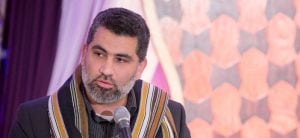
Dr. Ali Ataie
Dr. Ali Ataie is undoubtedly one of the foremost leading scholars in comparative religions today.
He is currently a teacher and researcher of the Islamic Sciences and specializes in theology and biblical interpretation. Additionally he is also the President and Founder of Muslim Interfaith Council and has been heavily involved in interfaith activities for the past 15 years. He earned his undergraduate degree in Accounting from Cal Poly State University in 2000, during which time he served as the President of the Muslim Students’ Association . He has been both a guest lecturer and guest instructor at several colleges and universities such as Cal Poly State , UC Davis , UC Berkeley, and Cal State East Bay . He studied various Islamic sciences under local Bay Area scholars and has dialogued and debated with several Christian scholars on a variety of topics ranging from the historicity of the resurrection of Christ (upon whom be peace) and the Prophet hood of Muhammad (upon whom be peace and blessings).
He is a graduate of the Badr Arabic Language Institute in Hadramawt, Yemen and studied at the prestigious Dar al-Mustafa under some of the most eminent scholars in the world. He holds a Masters’ Degree in Biblical Studies from the Graduate Theological Union in Berkeley, (the first Muslim seminarian in the 143 year history of the school to do so), and he has a PhD in Islamic Biblical Hermeneutics.
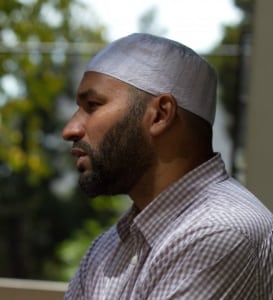
Dawood Yasin
Imam Dawood Yasin serves on the Board of Directors for the Lamppost Education Initiative. He spent five years in Damascus studying Arabic, Islam, and spirituality. Upon completion of his studies, he relocated to New Haven CT where he served as Imam of Masjid Al-Islam. While in New Haven he also worked as a teaching assistant and engaged in research at Yale University. Dawood also served as Director of Outreach at the Zayed Center for Islamic Culture in the United Arab Emirates, engaging in public speaking within U.A.E. and abroad, emphasizing ethics and tolerance between Muslim and non-Muslim communities. Dawood spent five summers teaching Arabic language at the Zaytuna Summer Arabic Intensive. Dawood has worked with colleagues to establish “Learning Outside of the Classroom” program at Zaytuna College, which includes service learning trips and a revival of traditional athletics found in swimming, archery and horseback riding. Education: Abu Nour Institute (Islamic Studies), Damascus, Syria 1997-2002, University of Massachusetts at Boston, B.A. Community Studies (2009), Dartmouth College, Masters of Arts in Liberal Studies, Globalization Studies (2017)
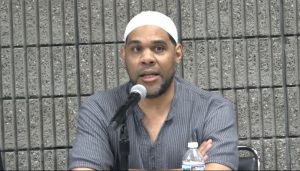
Imam Dawud Walid
Imam Dawud Walid is currently the Executive Director of the Michigan chapter of the Council on American-Islamic Relations (CAIR-MI), a chapter of America’s largest advocacy and civil liberties organization for Muslims. He frequently delivers khutbahs at Islamic centers across America and is a political blogger for the Detroit News. Imam Walid has spoken at some thirty institutions of higher learning about Islam and interfaith dialogue including DePaul University, Harvard University and the University of the Virgin Islands. He has also presented on prominent panel discussions with international leaders and academics including the 2008 and 2011 Congressional Black Caucus (CBC) Conventions and the 2009 and 2010 Malian Peace & Tolerance Conferences held in Bamako, Mali, which were attended by religious scholars from twelve different countries.
Imam Walid has been a regular contributor to the Muslim Observer newspaper and Illume Magazine and has also been interviewed, quoted, and published in numerous media outlets throughout the globe including Al-Jazeera, BBC, CNN, FOX, NBC World News, National Public Radio, the New York Times, USA Today and the Wall Street Journal. Imam Walid served as assistant Imam of Masjid Wali Muhammad in Detroit from 2001 until September 2011 while also serving as interim resident Imam of the Bosnian Islamic Center in Hamtramck during the summer of 2007. Imam Dawud Walid is currently a member of the Board of Directors for the Lamppost Education Initiative
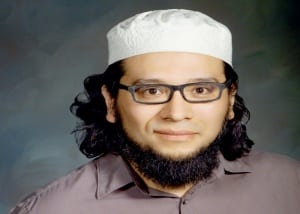
Giovanni Herran
Giovanni Herran has been an educator for nearly two decades and currently teaches Ethics at Temple University. He has taught subjects including comparative religion and Islamic intellectual history, and his Master's thesis in History researched the intersection between colonization, imperial culture, the production of race, and evolutionary theory. He is currently finishing his doctoral research on epistemology and non-dualism within the late Islamic heritage.
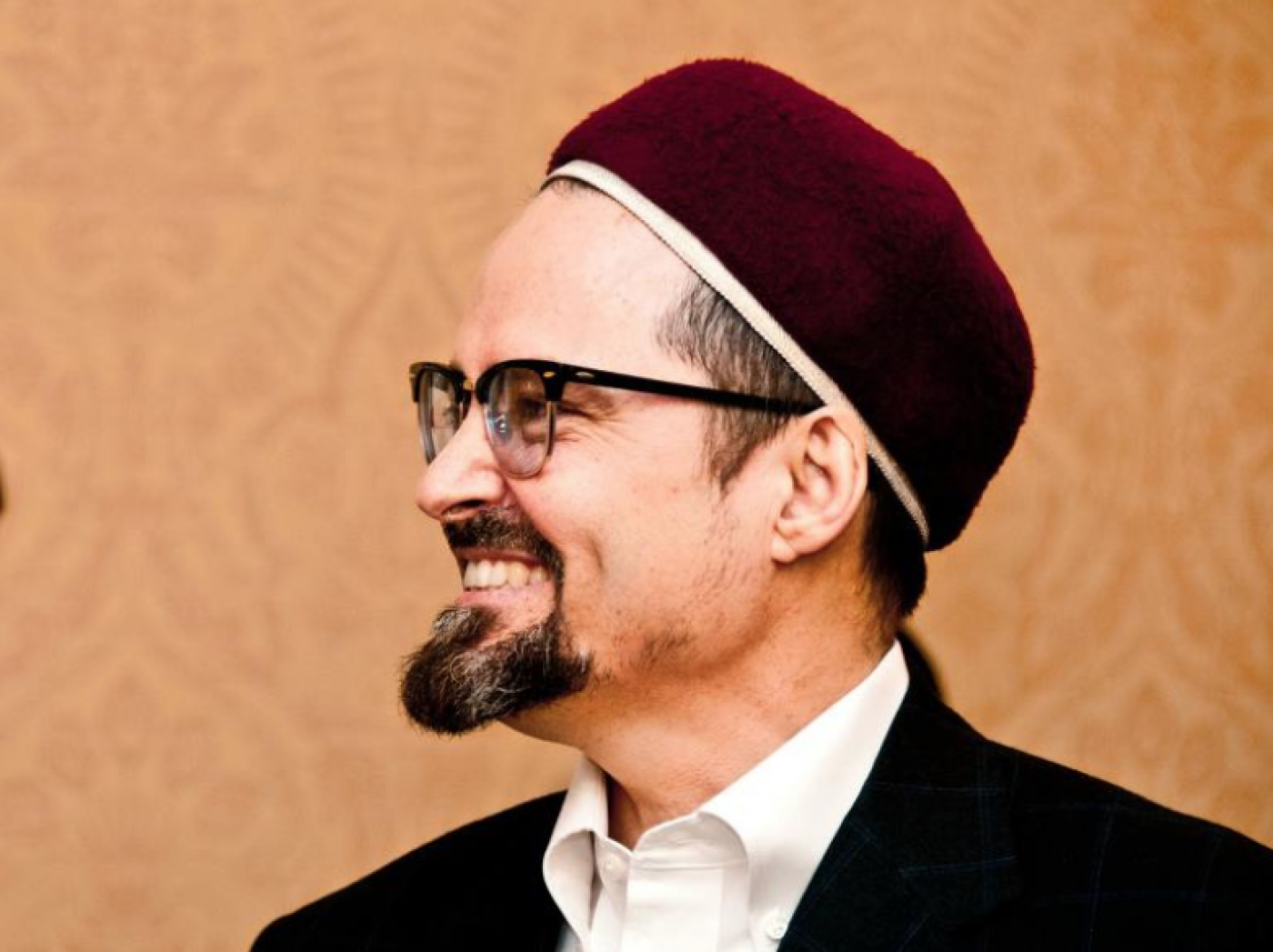
Shaykh Hamza Yusuf
Hamza Yusuf is the current president of Zaytuna College, located in Berkeley, California. He is an advisor to Stanford University’s Program in Islamic Studies and the Center for Islamic Studies at Berkeley’s Graduate Theological Union. He also serves as vice-president for the Global Center for Guidance and Renewal, which was founded and is currently presided over by Shaykh Abdallah bin Bayyah, one of the top jurists and masters of Islamic sciences in the world. For almost a decade, Hamza Yusuf was consecutively ranked as “The Western word’s most influential Islamic scholar” by The 500 Most Influential Muslims, edited by John Esposito and Ibrahim Kalin, (2009).
Yusuf is one of the leading proponents of classical learning in Islam. He has promoted Islamic sciences and classical teaching methodologies throughout the world.
Hisham Mahmoud
He holds a Ph.D. in Cultural and Historical Studies in Religion (2016) and an M.A. in Ethics and Social Theory 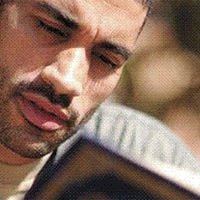 (2012) from the Graduate Theological Union. He obtained his B.A. (ijaza ‘ulya) in Islamic Law (Shariah) from the prestigious Al-Qarawiyin University of Fes, Morocco in 2001. He served as full time Islamic chaplain at the State Correctional Institute of Chester, PA from 2002-2007, and is the founding director of the Lamppost Education Initiative. He currently serves as a assistant professor of Islamic law and Prophetic Tradition at Zaytuna College in Berkeley, California His research interests include the interconnection between law and identity formation, comparative Islamic law, and Islam’s role in the modern world.
(2012) from the Graduate Theological Union. He obtained his B.A. (ijaza ‘ulya) in Islamic Law (Shariah) from the prestigious Al-Qarawiyin University of Fes, Morocco in 2001. He served as full time Islamic chaplain at the State Correctional Institute of Chester, PA from 2002-2007, and is the founding director of the Lamppost Education Initiative. He currently serves as a assistant professor of Islamic law and Prophetic Tradition at Zaytuna College in Berkeley, California His research interests include the interconnection between law and identity formation, comparative Islamic law, and Islam’s role in the modern world.
Ustadha Ieasha Prime
Ieasha Prime is a traditional Islamically trained educator, activist, and public speaker. She studied Arabic and Quran at the Fajr Institute followed by general 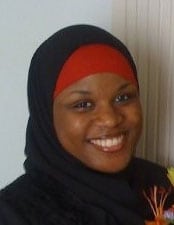 Islamic studies in Cairo, Egypt. After two years in Egypt, she moved to Hadramaut, Yemen and enrolled in Dar al Zahra, an Islamic University for Women. There she studied Aqeedah, Quran, Hadith, Arabic, Jurisprudence (Fiqh), Islamic law, Purification of the Heart and other religious related learning. Her lineage of scholarship from whom she received direct education can be traced directly back to the Prophet Muhammad (Salla Allahu alaihi wa Salaam) from the Husseini lineage. Under the tutelage of her professors, she has established several circles of knowledge and continues to teach and lecture across the United States and abroad. She now serves as the Executive Direction of Barakah. Inc
Islamic studies in Cairo, Egypt. After two years in Egypt, she moved to Hadramaut, Yemen and enrolled in Dar al Zahra, an Islamic University for Women. There she studied Aqeedah, Quran, Hadith, Arabic, Jurisprudence (Fiqh), Islamic law, Purification of the Heart and other religious related learning. Her lineage of scholarship from whom she received direct education can be traced directly back to the Prophet Muhammad (Salla Allahu alaihi wa Salaam) from the Husseini lineage. Under the tutelage of her professors, she has established several circles of knowledge and continues to teach and lecture across the United States and abroad. She now serves as the Executive Direction of Barakah. Inc
Ismail Royer
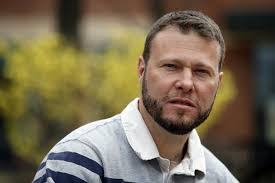
Ismail Royer is Research and Program associate at the Religious Freedom Institute (RFI), a non-profit organization based in Washington, DC. He converted to Islam in 1992 and studied political science at American University. He has studied religious sciences with scholars such as Dr. Jaafar Sheikh Idris and Sheikh Muhammad Nur Abdullah,as well as with a student of Sheikh Abdul Qadr al-Arnaout.
From 1993 to 2003, Royer worked in several non-profit Islamic organizations.
In June 2003, Royer was indicted on terrorism-related offenses for assisting the Pakistan-based Lashkar-e-Taiba (LET) and ultimately pleaded guilty to weapons charges related to the violation of United States neutrality laws. Since his release from prison in December 2016, he has worked with nonprofits to promote peace between faiths and undermine religious extremism. His writing has appeared in publications such as the Washington Post, Journal of Religion and Society, Public Discourse, Detroit Free Press, Al Jumuah, and Muslim Matters.
Dr. Jonathan Brown
Jonathan Brown is the Alwaleed bin Talal Chair of Islamic Civilization in the School of Foreign Service at Georgetown University. He received his BA in History from Georgetown University in 2000 and his doctorate in Near Eastern Languages and Civilizations from the University of Chicago 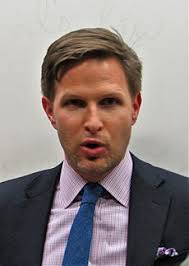 in 2006. Dr. Brown has studied and conducted research in countries such as Egypt, Syria, Turkey, Morocco, Saudi Arabia, Yemen, South Africa, India, Indonesia and Iran. His book publications include The Canonization of al-Bukhari and Muslim: The Formation and Function of the Sunni Hadith Canon (Brill, 2007); Hadith: Muhammad’s Legacy in the Medieval and Modern World (Oneworld, 2009; expanded edition 2017); Muhammad: A Very Short Introduction (Oxford University Press, 2011), which was selected for the National Endowment for the Humanities’ Bridging Cultures Muslim Journeys Bookshelf; Misquoting Muhammad: The Challenges and Choices of Interpreting the Prophet’s Legacy (Oneworld, 2014), which was named one of the top books on religion in 2014 by the Independent; and Slavery and Islam (Oneworld, 2019). He has published articles in the fields of Hadith, Islamic law, Salafism, Sufism, Arabic lexical theory and Pre-Islamic poetry and is the editor in chief of the Oxford Encyclopedia of Islam and Law. Dr. Brown’s current research interests include Islamic legal reform and a translation of Sahih al-Bukhari. He is also the Director of Research at the Yaqeen Institute.
in 2006. Dr. Brown has studied and conducted research in countries such as Egypt, Syria, Turkey, Morocco, Saudi Arabia, Yemen, South Africa, India, Indonesia and Iran. His book publications include The Canonization of al-Bukhari and Muslim: The Formation and Function of the Sunni Hadith Canon (Brill, 2007); Hadith: Muhammad’s Legacy in the Medieval and Modern World (Oneworld, 2009; expanded edition 2017); Muhammad: A Very Short Introduction (Oxford University Press, 2011), which was selected for the National Endowment for the Humanities’ Bridging Cultures Muslim Journeys Bookshelf; Misquoting Muhammad: The Challenges and Choices of Interpreting the Prophet’s Legacy (Oneworld, 2014), which was named one of the top books on religion in 2014 by the Independent; and Slavery and Islam (Oneworld, 2019). He has published articles in the fields of Hadith, Islamic law, Salafism, Sufism, Arabic lexical theory and Pre-Islamic poetry and is the editor in chief of the Oxford Encyclopedia of Islam and Law. Dr. Brown’s current research interests include Islamic legal reform and a translation of Sahih al-Bukhari. He is also the Director of Research at the Yaqeen Institute.
Dr. Khalid Yahya Blankinship
Born in Seattle, WA, Khalid Yahya Blankinship obtained his BA in History in 1973 from the University of Washington, an MA in Teaching English as a Foreign Language in 1975 from the American University in Cairo, and an MA in Islamic History in 1983 from Cairo University. His Ph.D. in History is from the University of Washington in 1988.
After traveling extensively in Europe and the Middle East, Blankinship long resided in Egypt and in Saudi Arabia at Makkah, becoming fluent in both classical and colloquial Arabic. He taught English for several years at 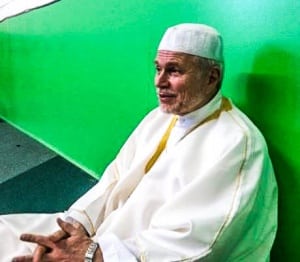 the American University in Cairo, and then History at the University of Washington. In 1990, Blankinship moved to Philadelphia, where he was appointed in the Department of Religion at Temple University. Promoted to the rank of Associate Professor in 1996, he has served as Chair of the Department of Religion 1998-2002, Departmental Graduate Director 2003-2013, and Chair again from 2013. He is active in lecturing and research on religion in general and Islam in particular.
the American University in Cairo, and then History at the University of Washington. In 1990, Blankinship moved to Philadelphia, where he was appointed in the Department of Religion at Temple University. Promoted to the rank of Associate Professor in 1996, he has served as Chair of the Department of Religion 1998-2002, Departmental Graduate Director 2003-2013, and Chair again from 2013. He is active in lecturing and research on religion in general and Islam in particular.
In addition to courses on Islam, he regularly teaches Religion in the World as well as Religion and Science. He has regularly presented papers at the annual meetings of the American Academy of Religion (AAR) and the American Oriental Society (AOS), and has also participated in meetings of the Middle East Studies Association (MESA). He has delivered lectures in many places, including Morocco, Saudi Arabia, Jordan, Egypt, India, and Malaysia. Also, Blankinship studied with a number of Muslim religious scholars, especially Shaykh Ismâ‘îl Sâdiq al-‘Adawî (1934-1998), the Imâm of Masjid al-Azhar in Cairo, and he has made the acquaintance of many well-known scholars of the Muslim world. He has posted a number of his responses to questions on Muslim law (on-line). He participated in the series of religious lectures in the Arabic language called al-Durûs al-Hasaniyyah (Hasanian Lectures) presented before the king in Morocco during Ramadân 1989-2000.Dr. Khalid Blankinship is a regular contributor to the Lamppost Education Initiative. We are pleased to announce that we have published a new book by Dr.Blankinship. ‘Murshid Al-Qari’-A Reader’s Guide to Classical Muslim Religious Literature in English’ is a unique work that explores the English translations of the Qur’an and Tafsirs.
Dr. Khalil Abdur-Rashid
Khalil Abdur-Rashid was born in Atlanta, Georgia. He completed his bachelor degree in Social Work and worked for the state of Georgia as a social worker for several years. 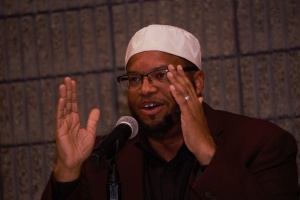 He pursued Islamic studies academically and traditionally which led him overseas to study for numerous years. He pursued a Master’s Degree in Istanbul, Turkey in Islamic Law at Marmara University.
He pursued Islamic studies academically and traditionally which led him overseas to study for numerous years. He pursued a Master’s Degree in Istanbul, Turkey in Islamic Law at Marmara University.
He also completed advanced Islamic seminary training and received his full doctoral license (Ijaaza) in Islamic Sciences. Khalil holds a Master of Arts in Middle East Studies as well as a Master of Philosophy in Islamic Law both from Columbia University in New York City. He recently received his Ph.D in Liberal Studies at Harvard University, specializing in the structure and representation of American Muslim identity.
He has taught numerous courses on Islam and Islamic law at NYU and Columbia University and taught Arabic language at Georgia State University.
He was the first paid Muslim Chaplain for Columbia University and Barnard College in New York City and served as an advisor to the NYPD Police Commissioner. He also served as Imam for several years in New York City and has lectured at Harvard, Princeton, and NYU. He served for several years as Scholar-in-Residence at the Islamic Association of Collin County. He has also served as an adjunct professor of Islamic Studies in the Graduate of Liberal Studies Program at SMU. He currently works as an Islamic chaplain at Harvard University

Imam Marc Manley
is the Religious Director for Middle Ground . A convert to Islam (1992), Imam Marc has had the opportunity to sit and study with many of the top Muslim teachers in Detroit, Philadelphia and Saudi Arabia. Imam Marc has been an active educator having taught Arabic and Islamic Studies as well as being appointed the Muslim Chaplain at the University of Pennsylvania and starting the Muslim chaplaincy program at Drexel University.
Shaykh Muhammad Mendes
Muhammad Adeyinka (pronounced: ah-deh-yin-ka) Mendes was born in the United States and raised in both the US and in Nigeria. At the age of 17, he embraced Islam 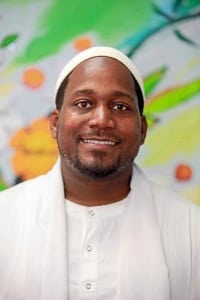 after a life changing journey to Palestine. While at Morehouse College and later at the Ohio State University, he pursued a BA in Arabic and began studying the classical sciences of Islam with scholars from various countries around the United States, among them were Shaykh Hamza Yusuf Hanson, Shaykh Muhammad Shareef, Dr. Antar ibn Standford Smith, Shaykh Nuh Keller, Ustath Ahmad Abdur-Rahman, Ustath Hamidou Taal, and Ustath Amr Khalifa.
after a life changing journey to Palestine. While at Morehouse College and later at the Ohio State University, he pursued a BA in Arabic and began studying the classical sciences of Islam with scholars from various countries around the United States, among them were Shaykh Hamza Yusuf Hanson, Shaykh Muhammad Shareef, Dr. Antar ibn Standford Smith, Shaykh Nuh Keller, Ustath Ahmad Abdur-Rahman, Ustath Hamidou Taal, and Ustath Amr Khalifa.
Upon graduation, he traveled to the Middle East and West Africa to sit at the feet of a number of notable scholars who further acquainted him with the major Islamic sciences of Qur’anic Recitation, Prophetic Narrations, Classical Arabic, Theology, Jurisprudence, and Purification of the Soul. Among the scholars he was blessed to learn from were Shaykh Fareed Azuz (Algeria), Shaykh Mustafa Turkmani (Syria), Shaykh Abdul-Halim al-Jaza’iri (Algeria), Shaykh Murabit al-Hajj (Mauritania), and Shaykh Ibrahim Makana (Nigeria). He also studied at Ma’had Abi Nour in Damascus, Syria, and has received licenses to teach (ijazat) from Shaykhs Uthman al-Imam an-Naijayri (Nigeria), Ibrahim Makana (Nigeria), Muhammad al-Ya’qoubi (Syria), Muhammad an-Ninowy (Syria), and Khalil Abdur-Rashid (USA).
Shaykh Muhammad An-Ninowy
Shaykh Dr. Muhammad bin Yahya Al-Husayni An-Ninowy was born and raised in Syria. He began his study under his father, Sayyed Yahya (Rahimahu Allah), and many of the senior scholars of Aleppo at the time, memorizing the Glorious Qur’an 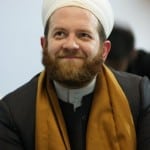 and acquiring knowledge in many of the Islamic disciplines, such as Tawheed, Hanafi/Shafi’i Fiqh, Usool, and Ihsaan
and acquiring knowledge in many of the Islamic disciplines, such as Tawheed, Hanafi/Shafi’i Fiqh, Usool, and Ihsaan
Besides graduating from the Faculty of Usul-ud-Din at Al- Azhar University, Shaykh Dr. Muhammad delved further into the fields of Hadeeth and Ihsaan under the tutelage of many of the foremost scholars worldwide, who resided in Syria, Hijaz, Morocco, Egypt, and others.
Shaykh Ninowy has established a global network of Madina Institutes which all strive to carry the same message. Shaykh Muhammad focuses on reviving the call to Deen with a Back to Basics approach i.e. the Qur’an and Authentic Sunnah, in addition to teaching tolerance, peace and compassion. Shaykh Muhammad is the senior-in-residence scholar at Madina Masjid and institute in Atlanta, Georgia since 2000. He has authored many books in the science of Tawheed, Hadith, and Usul, some of which are being translated into English and published, such as: The concept of Bid’a and its application, Nisf-Sha’ban virtues in the authentic Sunnah, Hadithi commentary on the Shamaa’el of Imam Tirmidhi, Explanation of the Nukhba Text in Hadith sciences, Explanation of the Al Fiyyah in Hadith terminology, Hadithi commentary on Imam Nasa’iy’s Khasaa’es, Expressing Delight for the birth of the Light, and more
Shaykh Muhammad is the founding director of “Planet Mercy” and Madina Institute & Seminary in the UK, South Africa, and Canada, and the USA. Shaykh Muhammad also holds a Bachelor’s Degree in Mircobiology from the University of Illinois and a Doctor of Medicine degree. Some of Shaykh Muhammad’s lectures can be viewed on: www.madinainstitute.org. Twitter: www.twitter.com/shaykhninowy and on www.facebook.com/alninowy
Mufti Niaz Hannan
Niaz Hannan is the Imam and Religious Director at ICSJ (Islamic Center of South Jersey) in Palmyra, NJ. Shaykh 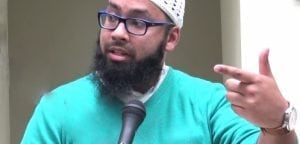 Hannan studied in the UK at Madinatul-Uloom Al-Islamiya and graduated as a ‘Ālim in the Islamic Sciences from Jamiatul Ilm Wal Huda. He completed a MA in Islamic Studies from the Markfield Institute of Higher Education (MIHE) and attended the Cambridge Muslim College, where he completed a Diploma in Contextual Islamic Studies in Leadership.
Hannan studied in the UK at Madinatul-Uloom Al-Islamiya and graduated as a ‘Ālim in the Islamic Sciences from Jamiatul Ilm Wal Huda. He completed a MA in Islamic Studies from the Markfield Institute of Higher Education (MIHE) and attended the Cambridge Muslim College, where he completed a Diploma in Contextual Islamic Studies in Leadership.
Dr. Rasul Miller
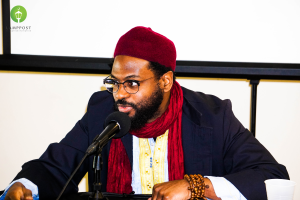 He has taught courses in African and African American history at the University of Pennsylvania and Drexel University. He received his BA in Economics and African and African American Studies at Duke University. His research interests include Muslim movements in 20th century America and their relationship to Black internationalist thought and West African intellectual history.
He has taught courses in African and African American history at the University of Pennsylvania and Drexel University. He received his BA in Economics and African and African American Studies at Duke University. His research interests include Muslim movements in 20th century America and their relationship to Black internationalist thought and West African intellectual history.
Dr. Rudolph Bilal Ware
Rudolph T. Ware III is an historian of West 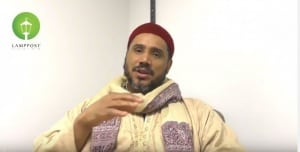 Africa, at the University of California Santa Barbara. He formerly taught at the University of Michigan and before that at Northwestern University. His work aims to confront and dispel Western misconceptions about Islam. He received his Ph.D. in history in 2004 from the University of Pennsylvania.
Africa, at the University of California Santa Barbara. He formerly taught at the University of Michigan and before that at Northwestern University. His work aims to confront and dispel Western misconceptions about Islam. He received his Ph.D. in history in 2004 from the University of Pennsylvania.
Dr. Sherman Jackson
Dr. Jackson holds the King Faisal Chair in Islamic Thought and Culture and is professor of religion and American studies and ethnicity at the 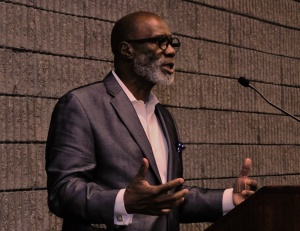 University of Southern California.Dr. Jackson received his Ph.D. from the University of Pennsylvania and has taught at the University of Texas at Austin, Indiana University, Wayne State University and the University of Michigan. From 1987 to 1989, he served as Executive Director of the Center of Arabic Study Abroad in Cairo, Egypt. He is the author of several books, including Islamic Law and the State: The Constitutional Jurisprudence of Shihâb al-Dîn al-Qarâfî (E.J. Brill, 1996), On the Boundaries of Theological Tolerance in Islam: Abû Hâmid al-Ghazâlî’s Faysal al-Tafriqa (Oxford, 2002), Islam and the Blackamerican: Looking Towards the Third Resurrection (Oxford, 2005) Islam and the Problem of Black Suffering (Oxford, 2009), and most recently Sufism for Non-Sufis? Ibn ‘Ata’ Allah al-Sakandari’s Taj al-‘Arus (Oxford, 2012).
University of Southern California.Dr. Jackson received his Ph.D. from the University of Pennsylvania and has taught at the University of Texas at Austin, Indiana University, Wayne State University and the University of Michigan. From 1987 to 1989, he served as Executive Director of the Center of Arabic Study Abroad in Cairo, Egypt. He is the author of several books, including Islamic Law and the State: The Constitutional Jurisprudence of Shihâb al-Dîn al-Qarâfî (E.J. Brill, 1996), On the Boundaries of Theological Tolerance in Islam: Abû Hâmid al-Ghazâlî’s Faysal al-Tafriqa (Oxford, 2002), Islam and the Blackamerican: Looking Towards the Third Resurrection (Oxford, 2005) Islam and the Problem of Black Suffering (Oxford, 2009), and most recently Sufism for Non-Sufis? Ibn ‘Ata’ Allah al-Sakandari’s Taj al-‘Arus (Oxford, 2012).
Dr. Jackson is a co-founder, Core Scholar, and member of the Board of Trustees of the American Learning Institute for Muslims (ALIM), an academic institution where scholars, professionals, activists, artists, writers, and community leaders come together to develop strategies for the future of Islam in the modern world.
Additionally, Dr. Jackson is a former member of the Fiqh Council of North America, former President of the Shari’ah Scholars’ Association of North America (SSANA) and a past trustee of the North American Islamic Trust (NAIT). He has contributed to several publications including the Washington Post-Newsweek blog, On Faith, and the Huffington Post. Dr. Jackson is listed by the Religion Newswriters Foundation’s ReligionLink as among the top ten experts on Islam in America and was named among the 500 most influential Muslims in the world by the Royal Islamic Strategic Studies Center in Amman, Jordan and the Prince Alwaleed Bin Talal Center for Muslim-Christian Understanding. Dr. Jackson is also a frequent contributor to the Lamppost Education Initiative.
Imam Talib ‘Abdur-Rashid
Imam Al-Hajj Talib ‘Abdur-Rashid is the religious and spiritual leader (Imam) of The Mosque of Islamic Brotherhood 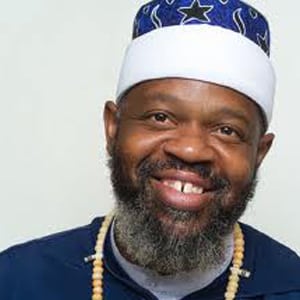 Inc. The mosque , located in Harlem, New York City, is the lineal descendant of the Muslim Mosque Inc. founded by the late El-Hajj Malik El-Shabazz (Malcolm X), in 1964. Imam ‘Abdur-Rashid is also the Amir (President) of the Majlis Ash-Shura (Islamic Leadership Council) of Metropolitan New York. Nationally, he serves as the Deputy Amir (Vice President) of The Muslim Alliance in North America.
Inc. The mosque , located in Harlem, New York City, is the lineal descendant of the Muslim Mosque Inc. founded by the late El-Hajj Malik El-Shabazz (Malcolm X), in 1964. Imam ‘Abdur-Rashid is also the Amir (President) of the Majlis Ash-Shura (Islamic Leadership Council) of Metropolitan New York. Nationally, he serves as the Deputy Amir (Vice President) of The Muslim Alliance in North America.
Ubaydullah Evans
Ustadh Ubaydullah Evans is ALIM’s first Scholar-in-Residence and now Executive Director. He converted to Islam while in high school. Upon conversion, Ustadh Ubaydullah began studying some of the foundational 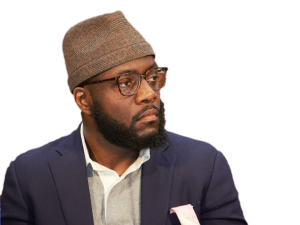 books of Islam under the private tutelage of local scholars while simultaneously pursuing a degree in journalism from Columbia. Since then he has studied at Chicagoland’s Institute of Islamic Education (IIE), in Tarim, Yemen, and Al-Azhar University in Cairo, Egypt, where he is the first African-American to graduate from its Shari’a program. Ustadh Ubaydullah also instructs with the Ta’leef Collective and the Inner-City Muslim Action Network (IMAN) at times.
books of Islam under the private tutelage of local scholars while simultaneously pursuing a degree in journalism from Columbia. Since then he has studied at Chicagoland’s Institute of Islamic Education (IIE), in Tarim, Yemen, and Al-Azhar University in Cairo, Egypt, where he is the first African-American to graduate from its Shari’a program. Ustadh Ubaydullah also instructs with the Ta’leef Collective and the Inner-City Muslim Action Network (IMAN) at times.
Shaykh Walead Mosaad
Walead Mohammed Mosaad was born in New York City in 1972 and grew up in New York and central New Jersey. He attended the Rutgers College of Engineering and obtained his B.S. in electrical engineering in 1994. During his university years, he was active in the Islamic Society of Rutgers 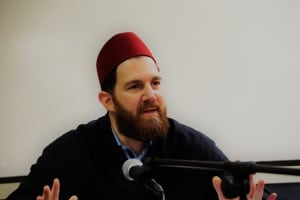 University for which he served as president. After graduation, he worked as a communications and network engineer in New Jersey and later in New York City. In the summer of 1997, he departed for the Middle East to study Arabic and Islamic sciences. After studying some of the Arabic sciences with a scholar from Dar Al-‘Ulum in Cairo, he enrolled in Mahad Al-Fatah in Damascus. Ustadh Walead then completed a degree in Arabic Language and Literature from Al-Azhar University in Cairo. He has also studied the Islamic sciences, including Quranic exegesis, marriage and divorce law, law of transactions, hadith methodology and commentary, juristic methodology, and spiritual sciences with notable scholars such as Shaykh Bakri Al-Tarabishi a Quranic scholar with the highest Quran ijaza in the world, Ustadh Ali Hamidullah, one of the foremost Arabic grammarians , Shaykh Kurayyim Rajih, the grand shaykh of Quran reciters in Damascus, Shaykh Ahmad Taha Rayyan, the foremost Maliki Shaykh in al-Azhar, and Shaykh Ali Jumua, the grand mufti of Egypt.
University for which he served as president. After graduation, he worked as a communications and network engineer in New Jersey and later in New York City. In the summer of 1997, he departed for the Middle East to study Arabic and Islamic sciences. After studying some of the Arabic sciences with a scholar from Dar Al-‘Ulum in Cairo, he enrolled in Mahad Al-Fatah in Damascus. Ustadh Walead then completed a degree in Arabic Language and Literature from Al-Azhar University in Cairo. He has also studied the Islamic sciences, including Quranic exegesis, marriage and divorce law, law of transactions, hadith methodology and commentary, juristic methodology, and spiritual sciences with notable scholars such as Shaykh Bakri Al-Tarabishi a Quranic scholar with the highest Quran ijaza in the world, Ustadh Ali Hamidullah, one of the foremost Arabic grammarians , Shaykh Kurayyim Rajih, the grand shaykh of Quran reciters in Damascus, Shaykh Ahmad Taha Rayyan, the foremost Maliki Shaykh in al-Azhar, and Shaykh Ali Jumua, the grand mufti of Egypt.
Additionally, he has been given written authorization, or ijaza, from the current Grand Mufti of Egypt, Shaykh Ali Jumua to transmit and teach the sacred sciences. He also received written authorization to teach Quranic recitation with the highest chain of authorization to the Prophet (SalAllahu wa alayhi wa salam), from Shaykh Bakri al-Tarabishi of Damascus. Upon returning to America, he taught at an Islamic school, served as a Muslim chaplain at Rutgers, and was an associate Imam at Dallas Central Mosque in Richardson, TX. Since 2005, Walead has been working at the Tabah Foundation to tackle problems of global concerns for Muslims. Most notably, he was a key member of the delegation to Denmark following the cartoon crisis, where along with other scholars, he engaged in dialogue with the people of Denmark and the Muslim minority of Denmark. He also oversees dawah projects in Europe, Africa and the Middle East. He has participated in deen intensive programs in California at the Zaytuna Institute, New Mexico, South America, and in the UK. He is currently based in the US
Lamppost Newsletter
Subscribe
Shaykh Yahya Rhodus
One of the well-respected Muslim scholars in the Western world, Shaykh Yahya has spent the best part of two decades studying at some of the most prestigious learning 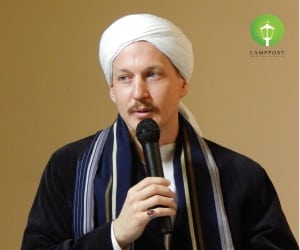 institutions in the Muslim and Western world. Having embraced Islam at the age of 19 in Santa Clara, California, he immediately began his study of the Islamic sciences with Shaykh Hamza Yusuf and visiting Mauritanian scholars, such as Shaykh Khatri Wuld Bayba, and Shaykh Abd Allah Wuld Ahmadna.
institutions in the Muslim and Western world. Having embraced Islam at the age of 19 in Santa Clara, California, he immediately began his study of the Islamic sciences with Shaykh Hamza Yusuf and visiting Mauritanian scholars, such as Shaykh Khatri Wuld Bayba, and Shaykh Abd Allah Wuld Ahmadna.
Shortly thereafter, he traveled to Mauritania to pursue a full-time course of study where he was able to learn from one of Mauritania’s greatest scholars, Murabit al-Hajj. Following an interim period of study in Damascus, Syria, Yahya went on to spend the best part of seven years in Tarim, in the Hadramawt Valley of Yemen. There, he studied at the reputable school, Dar al-Mustafa, with the renowned scholars Habib Umar bin Hafiz and Habib Ali al-Jifri.
Since that time, Yahya has been the official translator for Habib Umar and Habib Ali at various international speaking engagements, including the Common Word Conference held at Yale University in 2008. Upon returning to the United States, ShaykhYahya served as a full-time instructor at Zaytuna College. He holds a B.A. in Near Eastern Studies from UC Berkeley, an M.A. in Islamic Studies from the Graduate Theological Union, and is currently pursuing a PhD in Theology and Religious Studies at the University of Cambridge, England, in collaboration with Dr. Tim Winter (Shaykh Abdal Hakim Murad). He is the Founding Director of al-Maqasid.
Shaykh Yasir Fahmy
Shaykh Yasir began the study of Arabic and Islamic Sciences in his high school years under the guidance of local teachers. At the age of seventeen, he traveled to Amman, where he spent a year studying at the Islamic 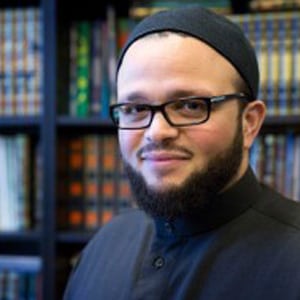 University of Jordan. He returned to the US and completed a Bachelor’s of Science from Rutgers University. After working in corporate America for three years in finance, he returned to the Middle East and enrolled in the prestigious Al-Azhar University in Cairo.
University of Jordan. He returned to the US and completed a Bachelor’s of Science from Rutgers University. After working in corporate America for three years in finance, he returned to the Middle East and enrolled in the prestigious Al-Azhar University in Cairo.
After seven years of intensive study, Shaykh Yasir received a degree in Islamic Studies from Al-Azhar and attained numerous ‘ijazas (independent certifications) in the subjects of fiqh, hadith, aqida, usul al-fiqh, sirah, tazkiyyah, mantiq, Arabic grammar (nahu), morphology (sarf) and rhetoric (balagha). In 2013, Shaykh Yasir Fahmy became the first American Azhari to teach in the renowned Al-Azhar Mosque.
Through his teaching, lecturing, mentorship, and religious leadership, Shaykh Yasir aims to foster love for the deen and appreciation of the vast richness of Islamic tradition in new generations of American Muslims.
Dr. Zara Khan
Zara Khan is a daughter, mother, wife, student, teacher and scholar in Political Science. She has a BA from Hunter College (City University of New York) MA./PhD. from The Graduate Center of the City University of New York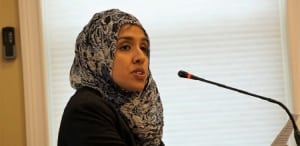 Her specializations are Comparative Politics, Political Theory and Human Rights. Her doctoral dissertation, “Refractions Through the Secular: Islam, Human Rights and Universality,” questions the universality claims of Human Rights on account of their secular definition of the human being, and unsettles the modern concept of ‘religion.’ She has taught comparative politics, social science literature and political theory at Lehigh University, The City University of New York and New Jersey City University. She has published a report-back from a fact-finding mission to the West Bank in a women-of-color feminist magazine. She is fluent in Urdu and Spanish. Her next scholarly project will attempt, in sha’ Allah, to problematize the state-of- nature concept by drawing on foundational classical Islamic governance themes.
Her specializations are Comparative Politics, Political Theory and Human Rights. Her doctoral dissertation, “Refractions Through the Secular: Islam, Human Rights and Universality,” questions the universality claims of Human Rights on account of their secular definition of the human being, and unsettles the modern concept of ‘religion.’ She has taught comparative politics, social science literature and political theory at Lehigh University, The City University of New York and New Jersey City University. She has published a report-back from a fact-finding mission to the West Bank in a women-of-color feminist magazine. She is fluent in Urdu and Spanish. Her next scholarly project will attempt, in sha’ Allah, to problematize the state-of- nature concept by drawing on foundational classical Islamic governance themes.
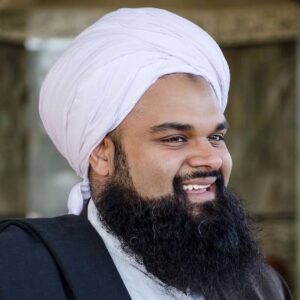 Shaykh Hamza Maqbul
Shaykh Hamza Maqbul
He was born in Whittier, California, and lived in Southern California until the age of ten when he moved to Blaine, Washington. After graduating from Blaine High School, he went on to attend the University of Washington and in 2004 completed a Bachelors of Science in Biochemistry and a Bachelors of Arts in Near Eastern Languages and Civilizations.
During his study at the university he was active on campus, serving as the president of the UW Muslim Students Association. After 9/11 he was also listed by the University of Washington as an expert on Islam and was invited to address various groups from all walks of life from universities to high schools to community groups as well as all forms of media (TV, Radio, Newspaper, Internet).
After graduation Shaykh Hamzah went on to pursue traditional Islāmic studies, which took him to a number of countries, including Syria and Egypt where he studied the Arabic language, Morocco, Mauritania, and UAE, where he studied the madhhab of Imām Mālik, grammar, usul al-hadith, and the two renditions of the qira’ah of Imam Nāfi’, Warsh and Qālūn, and finally Pakistān where he had the opportunity to study tafsīr, Usūl al-Hadīth, Hadīth, ‘Ilm al-Rijāl and Hanafī Fiqh.
All of these studies culminated in him receiving an Ijāzat al-Tadrīs, literally meaning “a license to teach” which is the equivalent in Pakistānī Islāmic seminaries to a MA in Arabic and Islāmic studies, as well as an unbroken chain of transmission by which to narrate the Hadīth of such books as the Muwatta’ of Imām Mālik, the Sihāh al-Sittah (Bukhārī, Muslim, Abū Dāwūd, Tirmidhī, Nasā’ī and Ibn Mājah), and the Sharh Ma’ānī al-Athār of Imām al-Tahāwī.
After his return to the United States, Shaykh Hamzah spent five years as the resident scholar of the Thawr Institute, a non-profit religious and educational organization based in Seattle, Washington, teaching, giving khutbahs in local Masājid, and travelling through America promoting the knowledge and practice of the sunnah. In parallel with his work at Thawr, he worked closely with Islamic Relief, CAIR Seattle, and a number of other non-profit organizations that serve the Muslim Community.
Ustadha Zaynab Ansari
Zaynab Ansari spent a decade studying Farsi, Arabic, and traditional Islam, sitting with 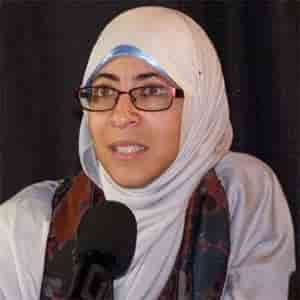 male and female scholars in seminaries in the Middle East, including traditional scholars in Damascus in the 1990s. Upon her return to the United States, she earned degrees in history and Middle Eastern Studies from Georgia State University.
male and female scholars in seminaries in the Middle East, including traditional scholars in Damascus in the 1990s. Upon her return to the United States, she earned degrees in history and Middle Eastern Studies from Georgia State University.
Since 2014, Zaynab Ansari has served as a scholar-in-residence for Tayseer Foundation, offering enrichment courses and halaqahs to women and youth in the Muslim Community of Knoxville, and working on interfaith dialogue. She is currently an instructor at Tayseer Seminary, which features a one-year intensive in Islamic Studies, drawing students from Tennessee and all regions of the United States.
Ustadha Zaynab has previously written and taught for SunniPath and the Lamppost Education Initiative. She has been a freelance writer for Azizah Magazine, a certified speaker with the Islamic Speakers Bureau of Atlanta, and a contributor to online Islamic educational portals such as SeekersHub. She has also served as the coordinator of oral histories for the After Malcolm Project, a digital archive of African-American Muslim history. She is part of the teaching faculty of the Ribaat Program, an online Islamic Studies curriculum led by Anse Tamara Gray, a leading woman scholar of traditional Islam. She is also a board member of Tayseer Seminary.
Imam Siraj Wahhaj
Imam Siraj Wahhaj is an African-American Muslim convert to Islam and public figure for Muslims in North America. He is currently the Imam of Al-Taqwa mosque in Brooklyn, New York . Born and raised in New York, he became a Sunday school teacher as at a young age, then later went to Wilfrid Laurier University (WLU) where he studied biology education.
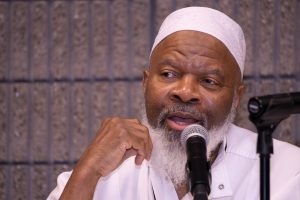 In 1969 he joined the Nation of Islam and was taught under Louis Farrakhan at the height of the NOI’s anti-Malcolm X rhetoric. He became a Sunni Muslim after the death of Elijah Muhammad in 1975 and Muhammad’s son Warith Deen Mohammed took over and reorganized the organization, urging members to come to orthodox Islam. Kearse then changed his name to Siraj Wahhaj. He was chosen to study Islam at the Umm al-Qura university of Mecca in 1978. He also briefly taught a course in Islamic studies at Howard University. In 1981 he started his own mosque, Masijd ul-Taqwa, in a friend’s apartment in Brooklyn. Although it originally started out with only 25 people, today it is well-known.
In 1969 he joined the Nation of Islam and was taught under Louis Farrakhan at the height of the NOI’s anti-Malcolm X rhetoric. He became a Sunni Muslim after the death of Elijah Muhammad in 1975 and Muhammad’s son Warith Deen Mohammed took over and reorganized the organization, urging members to come to orthodox Islam. Kearse then changed his name to Siraj Wahhaj. He was chosen to study Islam at the Umm al-Qura university of Mecca in 1978. He also briefly taught a course in Islamic studies at Howard University. In 1981 he started his own mosque, Masijd ul-Taqwa, in a friend’s apartment in Brooklyn. Although it originally started out with only 25 people, today it is well-known.
In 1988 he led his community in an anti-drug patrol in which they staked out drug houses in Bedford-Stuyvesant in the cold of winter for 40 days and nights, forcing the closure of 15 drug houses. This effort received high praise from the New York City Police Department and the media.
Since that time, Siraj has been active in many Islamic organizations. He has been vice president of the Islamic Society of North America since 1997 and has served on the Majlis al Shura, a consultative council of Islamic scholars, since 1987.
Siraj is a prolific speaker in America. He makes many appearances at major North American Muslim conventions, and numerous forums and lectures including the Lamppost Education Initiative’s 2019 Black American Muslim Conference
Imam Zaid Shakir
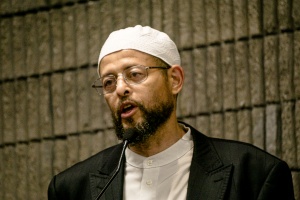
Zaid Shakir is co-founder and senior faculty member of Zaytuna College and also serves on its Board of Trustees. In 1983, while at Rutgers University, New Brunswick, NJ., he co-founded the New Brunswick Islamic Center formerly Masjid al-Huda. In 1987, he settled in New Haven, CT., and continued his community activism co-founding Masjid Al-Islam. Zaid Shakir moved to Hayward, California to serve as a scholar-in-residence and lecturer at Zaytuna Institute in 2003. He co-founded the Lighthouse Mosque, Oakland, CA. in 2007. He co-founded Zaytuna College in 2009, where he now teaches Islamic law and history. Zaid Shakir is one of the signatories of A Common Word Between Us and You, an open letter by Islamic scholars to Christian leaders, calling for peace and understanding. Known to the world as Imam Zaid, he has authored numerous articles on a wide range of topics, becoming a voice of conscience for American Muslims and non-Muslims alike. Recently, he was ranked as “one of the western world’s most influential Scholars The 500 Most Influential Muslims, edited by John Esposito and Ibrahim Kalin, (2009). Imam Zaid is featured in numerous Lamppost works including our new book, “Tears of the Yearners for the Meeting With God” by Ibn Rajab al-Hanabli
